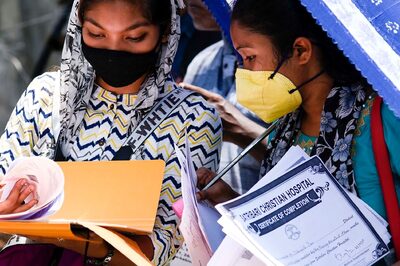
views
Islamabad: Pakistan's opposition leader accused the powerful spy agency of negligence and incompetence on Wednesday as the country's former president said rogue members of the security establishment may have helped Osama bin Laden hide for years near Islamabad.
Ratcheting up pressure on the country's military as it fights off suspicion that it sheltered the al Qaeda leader, rival India named five Pakistani army officers in a list of 50 criminals it wants extradited to stand trial on terror charges.
Nawaz Sharif, who heads Pakistan's largest opposition group, rejected a government decision to put an army general in charge of the inquiry into intelligence lapses that led to the killing of bin Laden in a helicopter raid by US commandos on May 2.
Sparing the government and its leaders in his tirade over the breach of Pakistan's sovereignty by US forces, Sharif blamed the "worst case of negligence and incompetence" by the country's security agencies.
"It is (a) matter of serious concern that our security institutions knew nothing when the helicopter gunships and commandos remained in our territory and airspace for so long," he told a news conference, calling for a judicial commission to lead the investigation to dispel doubts about its objectivity.
Sharif demanded to know how the world's most-wanted man could remain holed up in a compound less than a kilometre (0.6 miles) from the country's main military academy, and bemoaned the damage the matter has caused to Pakistan's reputation abroad.
"Isn't it true that (the) world considers us as a country that abets and exports terrorism?" he said.
Former Pakistani President Pervez Musharraf, an army general who seized power in 1999 and now lives in exile in London, told ABC News that there is a possibility that rogue junior officers in the country's intelligence and military might have been aware of bin Laden's whereabouts for years.
"It's really appalling that he was there and nobody knew," Musharraf said. "But rogue element within is a possibility. The possibility ... (is that there was), at the lower level, somebody following a policy of his own and violating the policy from above."
In Washington, a senior US lawmaker said it was not clear that senior Pakistani officials had sheltered bin Laden.
"Today, from all the information I have seen, we can't conclusively say that somebody senior knew and promoted safe haven," said US Representative Mike Rogers, chairman of the US House of Representatives Intelligence Committee.
US lawmakers are questioning whether Pakistan is serious about fighting militants in the region, and some have called for a suspension of American aid to Islamabad.
Pakistan's pervasive Inter-Services Intelligence (ISI) agency has a long history of contacts with Islamist militants.
The United States has sent intelligence extracted from material seized from bin Laden's compound in Pakistan to several foreign governments, US and Western counter-terrorism officials told Reuters.
Among the material being examined most closely is what a US official described as a "handwritten manual" that American experts believe was penned by bin Laden himself.
The United States and the governments with which it has shared data have found no evidence of specific, imminent plots against US or Western targets, officials said.
The US raid on bin Laden's compound has embarrassed and enraged Pakistan's military and has added to already strained ties between Washington and Islamabad.
Pakistan rejects allegations that it was either incompetent in tracking down the man behind the Sept. 11, 2001, attacks on the United States or complicit in hiding him in the town of Abbottabad just 50 km (30 miles) from Islamabad.
"We wouldn't be naive enough to be complicit in this affair. We would be risking not only the future of our country, but also the future of our children," said a senior security official, adding that if a support network was protecting bin Laden it did not come from within the security establishment.
The security official said the US operation had left the Pakistani army and the ISI discredited in the eyes of the public."
"We are very angry about this breach of trust," the official said, speaking on condition of anonymity. "The space for cooperating with the Americans on military and intelligence operations has been shrunk because of this incident."
Compounding the pressure on the army, India for the first time directly accused a handful of serving Pakistani military officers of being involved with militancy. New Delhi's list of its 50 "most-wanted" criminals was handed to Islamabad in March, but its contents have only just been released.
India has long accused arch-rival Pakistan of harbouring militants such as those behind the 2008 Mumbai attacks that killed 166 people, who it says were supported by the ISI.
A day before talks with Pakistani President Asif Ali Zardari in Moscow, Russian President Dmitry Medvedev said bin Laden's killing would help Russia fight an Islamist insurgency in the south.
"The liquidation of terrorists, even on the level of ... bin Laden, has a direct relationship to the level of security on the territory of our state," Medvedev said in his first public comments on the al Qaeda leader's killing.
Russia's government faces a growing insurgency in mostly Muslim provinces of the North Caucasus after two wars since 1994 involving federal forces and separatist rebels in Chechnya.
In Beijing, Afghanistan's Foreign Minister Zalmai Rassoul said bin Laden's death may speed up reconciliation efforts between the Taliban and the Afghan government.



















Comments
0 comment